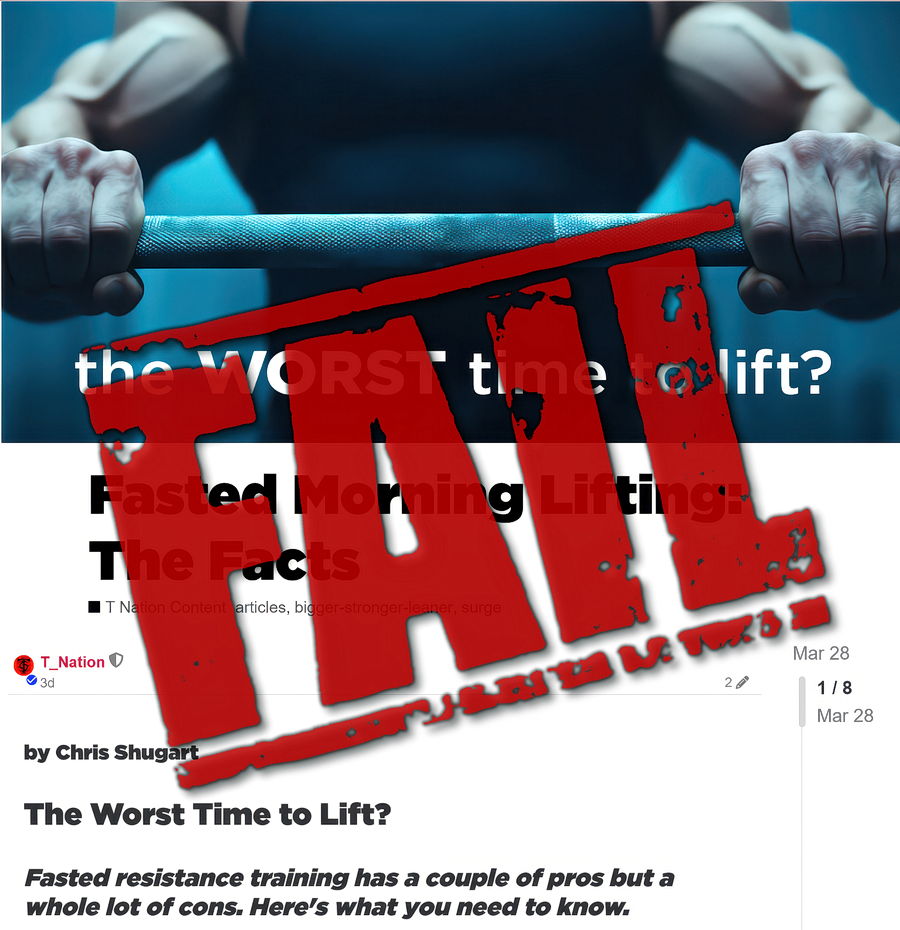Today we’ll look at another great example of the huge problem of people being deceived into believing that consuming carbohydrates and running on a toxic and damaging glucose metabolism is normal and natural when, in fact, humans are made to run on a fat metabolism while being in ketosis. And unfortunately, this big misconception (fraud) is reflected in almost any “nutritional” study ever conducted, as it simply means that every participant is, or has recently been running on a very unhealthy and unnatural glucose metabolism.
Now, the very ignorant and uneducated supplement-pusher Chris Shugart of T-Nation recently posted an article about the worst time to lift weights, as in when not to do resistance training. Let’s see how much he f**ked up on this topic.
“Fasted resistance training has a couple of pros but a whole lot of cons. Here’s what you need to know.”
A whole lot of cons? Oh, really? I hope you know how to differentiate between that of toxic damaged people consuming carbohydrates and running on an exogenous provided glucose metabolism and that of healthy people consuming mostly animal fat and animal protein, running on our natural fat metabolism where we can manufacture all the glucose we need, and a lot quicker than consuming it, through gluconeogenesis whenever we need it.


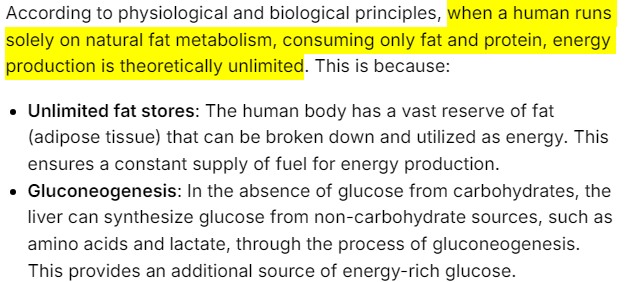

“I’ve been lifting for 30 years. I’ve been a morning, noon, afternoon, and nighttime lifter. For me, morning lifting is best. The biggest challenge is nutrition. Fasted resistance training never seemed smart, but I didn’t want to train on a full stomach, either.”
30 years you say? I could never have guessed. I started at age 11, so that’s just about 40 years of lifting for me and then training, nutrition, supplementation, coaching, medical science and pharmacology was my profession for more than 20 years before I recognized the inverted and fraudulent science and pursued health instead. And yes, lifting in the morning, or at least before lunch also suits me best as it sets the tone for the day and gets you going. Also, training later in the day will leave your core body temperature elevated and your central nervous system highly activated for several hours afterwards, which can interfere with sleep. And if you train in the evening, you surely want to eat after that training session, making things even worse for the body as digestion also interferes with sleep, recovery and detoxification. So, no. Training later than 4.00 p.m. is very bad for your sleep, especially if you have a meal afterwards. Actually, to get the best sleep and recovery, your last meal should be around 4 to 5 p.m., and then you should start to wind down and take it easy, preparing for a restful night. Going to the gym at that hour will be the complete opposite and in a way very stupid.
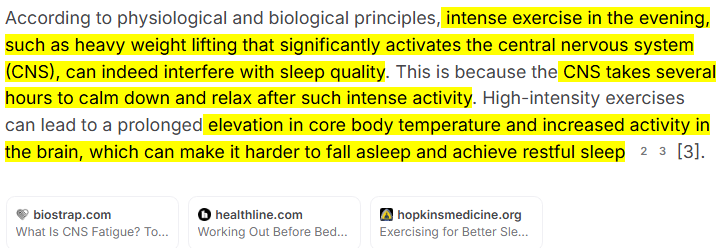
As for fasted training, we’ll get to that. Personally, I have some animal fat, usually butter, and some protein when I wake up, and then I’m usually at the gym 2 or 3 hours later. I only have some electrolytes as in sodium and potassium right before and during my training.
Fasted AM Lifting: Questions and Answers
“1. Do you lose fat faster?
It’s a common claim: Fasted workouts increase fat oxidation and enhance fat utilization. But do they?”
Only if you’re fat adapted and your body efficiently can tap into your body fat to fuel you. That is common sense. In people running on carbohydrates, as in exogenous provided glucose, this is severely hindered so it’s not really noticeable. But again, who cares? Fat loss is not why we lift weights. If you want to lose fat, do some fasting or skip a few meals on two or three days a week. Simple.

“First, the elephant in the room: Fat loss isn’t the main goal of weight training. Yes, the long-term metabolic boost from having more muscle leads to fat loss and having an easier time staying lean, but we don’t lift to burn calories; we lift to build muscle and strength. Fat loss is adjacent and better addressed through diet.”
The first sensible thing you’ve said in a long time, Chris. Except for the calorie thing. Calories are a measurement of heat produced from burning food stuff in an isolated chamber raising the temperature of water. Not really how our body works, is it? And you can’t lift weights to “burn” heat units. That makes no sense. The human body does not burn anything, and you can’t burn a measurement of heat. The human body works through chemical- processes and reactions, so we expend some energy and nutrients when we lift weights, not imaginary heat units that some dimwit named “calories.”
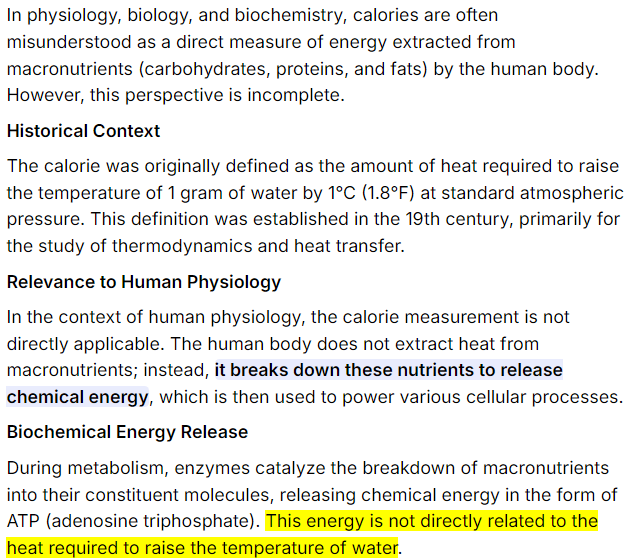

“A study in the Journal of the International Society of Sports Nutrition examined body composition changes over four weeks of aerobic exercise performed in either fasted or fed states among women on a hypocaloric diet. There were no significant differences in weight loss or fat mass reduction.”
Because 99.9% of all women, especially those picked for retarded studies and trials, are following a typical western diet high in carbohydrates and plant-based crap. And even if they were to do a ketogenic-style diet, it takes at least 16 to 26 weeks to “fully” re-adapt to your natural metabolism, so any recordings or measurements taken before that re-adaptation phase is irrelevant. Also, most ketogenic diets are very unhealthy as they incorporate some vegetables and even worse, seed/vegetable oils that are extremely toxic. The only natural foods for humans are animal-based foods such as animal fat, meat, organs, eggs and the occasional dairy.
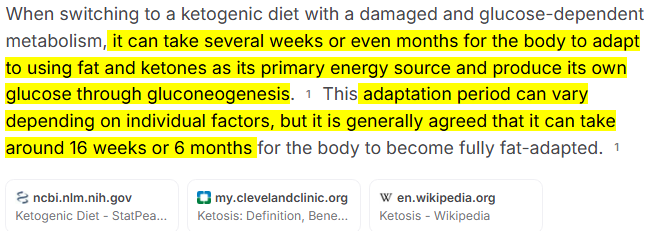
“Another cardio study (Paoli et al.) found that more fat was used for fuel in the fasted state, but the opposite happened after the workout: fat utilization was significantly lower in the fed group for up to 24 hours. In other words, the fasted trainers burned a little more fat during the workout but burned less the rest of the day. Fasted cardio led to lower resting energy expenditure (fewer calories burned) and less total fat utilization over 24 hours.”
For f**ks sake, Chris. That is what happens when you feed and eat carbohydrates. Carbohydrates turn into toxic glucose and your body goes into an emergency mode, releasing unnatural amounts of insulin to try and remove that excess of glucose as fast as possible. And what happens when the body prioritizes glucose removal? Yes, fat oxidation is almost totally shut down. You do not use fat as energy as long as blood glucose is elevated above normal levels, as that takes priority or you could die from the damage caused by elevated blood glucose.


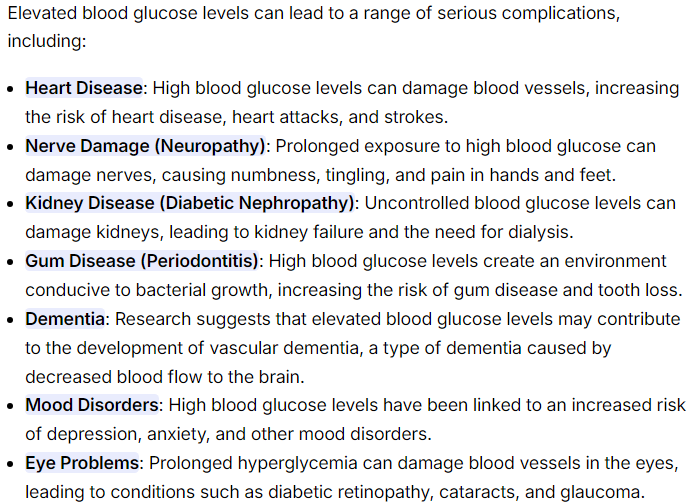

“2. Are your lifting workouts more focused when fasted?
It’s possible. Training on an empty stomach improves cognitive sharpness for some because digestion isn’t competing for energy. However, this may come down to what you’re eating (and how much) before the workout.”
Only if you are somewhat fat adapted and only if you compare to someone running on carbohydrates and thus can’t utilize his or her brain properly. Keep in mind that your brain, to work optimally, requires both glucose, which is provided by gluconeogenesis, and ketones, which are provided by being in ketosis, as in running on a fat metabolism. If you consume carbohydrates, you are running on glucose and not fats, hence ketosis is barely noticeable and the brain will not get anywhere near the ketones it wants to work optimally. That is why you feel and perform so much better when you are running on fats, as in following a ketogenic diet or our natural human carnivore diet.

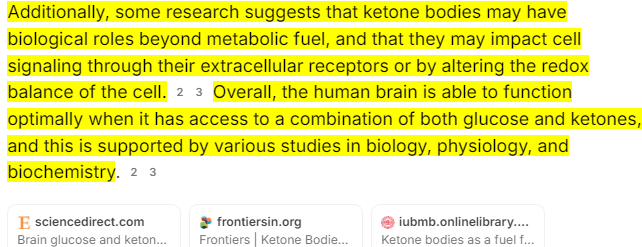

As for digestion, it mostly interferes with physical performance. If you feel tired or less “cognitively sharp” after a meal, that meal was inappropriate for your species and most likely contained carbohydrates and a lot of toxins. There should be no negative difference in energy levels or how you feel and perform after having a meal. We who follow our natural human diet actually feel even more energized and mentally sharp after a meal.

“Training fasted elevates your already-high morning cortisol levels. This can feel good in the short term. Cortisol enhances cognitive function, reaction time, and focus as part of the fight-or-flight response. Cortisol also mobilizes glucose and fatty acids for energy, temporarily boosting stamina.”
Testosterone, growth hormone and cortisol are naturally elevated in the morning to make you energized and primed for hunting and searching out food. This is natural and if you are fat adapted and fully nourished, as in not having any nutrient deficiencies, you will have all the fat and glucose you need to “fuel” you in a fasted state for several weeks. Lifting weights for an hour or so will not be a challenge.

However, if you’re used to a glucose metabolism, you might not feel as energized and you might also break down muscle mass (catabolism) to provide more energy as your body is not used to relying on fats or making its own glucose through gluconeogenesis, or producing ketones, and simply has to rely on whatever glucose it can release from glycogen stores.

“So, is that “stress hormone high” worth the price of cortisol’s other effects on the body, like muscle protein breakdown? Lifting weights with the muscle-eating hormone coursing through your body doesn’t seem like a great idea, even if it makes you feel perky.”
Cortisol is not a stress hormone, I’ve explained this misconception many times. Cortisol serves several functions. It helps the body with releasing stored glycogen through its natural process of gluconeogenesis, which is converted into glucose in the exact amounts needed to fuel the tissues that need it. Also, cortisol is needed for healing and repair, just like cholesterol.

Increased cortisol, to the level where it can be “muscle-eating” can only happen in people who are not properly fat adapted, in people who are stressed and/or artificially induce an fight-or-flight response through chemicals like caffeine or consuming toxic carbohydrates and similar plant toxins, and/or people with nutrient deficiencies that interfere with our natural metabolism. So, yes, in the vast majority of people who consume carbohydrates and follow a diet that contains a lot of plant-based and processed edibles, high levels of cortisol might cause muscle protein breakdown. However, in intelligent people who follow our species-appropriated and species-specific carnivorous diet, cortisol will never be elevated above normal levels and it can never cause harm.
And this Chris, is why I started the article with the comment, “I hope you know how to differentiate between toxic damaged people consuming carbohydrates and running on an exogenous glucose metabolism and healthy people consuming mostly animal fat and animal protein, running on our natural fat metabolism.”
I guess we all can see that you clearly do not know or understand the difference, nor do you understand what a species-specific diet is, as in our natural human diet.
Chris, you’re embarrassing yourself. You need to go back to the basics of biology, physiology and biochemistry.


“3. But aren’t GH and testosterone highest in the morning?
Yes, growth hormone (GH) and testosterone tend to be higher in the morning for men due to their natural circadian rhythm. GH spikes highest during deep sleep, but it’s still elevated in the morning. Testosterone follows a diurnal rhythm, peaking in the morning (around 6-8 AM) and gradually declining throughout the day.”
Yes, and if you are fully fat adapted, this hormonal release will help with getting a good hunt, or a good training session. Also, the higher levels of hormones will protect your muscle mass while you are in a fasted state, as in the past that would simply have meant a usual day of hunting and searching for food.
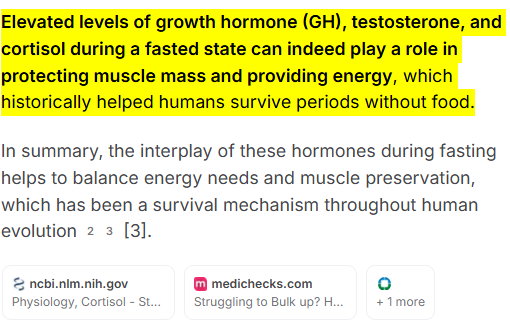
“At best, elevated morning GH and T might help reduce some of the drawbacks of fasted lifting compared to, say, afternoon fasted lifting, but the cons of fasted resistance training outweigh any possible pros.”
Again, there are no “cons” if you are a healthy fat adapted man or woman following our natural diet. There might be “cons” if you’re a gullible fool following the dietary recommendations of your slave masters, as in consuming carbohydrates and processed junk. But that’s your own fault, not the fault of our physiology and hormones.
After this, Chris summarized his alleged “drawbacks,” which are only applicable if you’re an unhealthy deceived slave consuming crap that is inappropriate for your species. Again, that’s on you. For the rest of us, there are no “drawbacks.”
And of course, as a supplement-pusher, Chris ends his atrocious article by recommending that you drink your breakfast, as in having a meal replacement drink. Yes, the most toxic and processed garbage you can think of! Total insanity. He even mentions “highly branched cyclic dextrin,” a very quick-acting and highly toxic sugar, as in carbohydrates. I covered this poison in my article “Cyclic Dextrin is Toxic Crap.”
To conclude, if you enjoy lifting weights in moderation to keep your body strong and more resilient, it doesn’t really matter when you lift or if it’s in a “fasted state” or not. Just stay away from training or doing any kind of intense exercise late in the day, as it might interfere with sleep.
If you need help with any kind of health problems or transitioning from your current way of eating to our natural species-appropriate, species-specific way of eating, I’m available for both coaching and consultation.
Coaching and Consultation
And if you found the article and my insights helpful and enjoy my daily free information, please consider donating to help pay the webhosting bills and keep the site running. And if you’re interested in discussing and sharing information with likeminded people, consider joining our uncensored community at Ungovernable.se. Thank you!

